Gut health for better sleep quality

The gastrointestinal tract is connected directly with the brain and can affect sleep, psychological function, and behavior. For this reason, it is often referred to as the second brain of the human body. Brain health instantly affects gut health. The intestine is almost the size of two tennis courts.
Because it is exposed to the outside environment at both ends, the gut might be home to a complex, growing population of trillions of bacteria, viruses, and fungi known as the gut microbiome. A healthy and balanced gut microbiome consists of beneficial and pathogenic bacterial strains, which have a bidirectional effect on health.
About one-third of the composition of the gut microbiome is identical to most people, while two-thirds are unique to each individual. The structure of the gut is constantly evolving throughout life. The gut begins to colonize microbes after birth. Environment and diet play an essential role in the composition of the gut microbiome.
For example, a person who is vegan or lives in New York will have a different microbiome than someone who lives in Italy and eats spaghetti. In addition to external factors, numerous lifestyle stressors can disrupt the average balance of gut bacteria.
Processed foods, added sugar, lack of fiber, insufficient hydration, exercise, emotional or mental stress, overuse of antibiotics, and many other factors can impact the gut microflora. Stress increases the number of pathogenic bacteria in the gut, potentially resulting in inflammatory bowel disease, leaky gut syndrome, diabetes, obesity, or sleep disorders.
A balanced gut microbiome is essential for daily bodily function, including metabolism, digestion, immune function, and more pleasing sleep quality.
Gut and sleep
A study showed that adults who have poor sleep quality show disturbances in the gut microbiome, as well as reduced cognitive function. In reality, the relationship between the gut and sleep is complex.
Insufficient, inconsistent, or low-quality sleep is the cause of an increased risk for chronic conditions such as diabetes, heart disease, obesity, and depression. In turn, these conditions are associated with an imbalance of microbes in the gut, known as dysbiosis.
Why is this happening?
The brain comprises millions of neurons that connect it to the rest of the body, including the gut, the central part of the nervous system that controls the gastrointestinal tract. The vagus nerve connects a network of nerves in the gut to different brain areas.
The vagus nerve communicates constantly with the gastrointestinal tract and the brain. This nerve is referred to as the gut-brain axis. Bacteria in the gut produce certain neurotransmitters, such as GABA, dopamine, and serotonin.
These neurotransmitters stimulate neurons in the enteric nervous system to communicate with the brain again. Ninety percent of serotonin is in the gut.
How does this relate to sleep?
Melatonin is a sleep hormone responsible for managing the body's circadian rhythm. Mainly it is produced by the pineal gland, located in the brain's center. The pineal gland is an endocrine gland in the body. It is the only area of the body that has photosensitive cells.
If the pineal gland is not functioning, the body depends on the gut as a backup option. Tryptophan can be converted to melatonin in the gut to help regulate the sleep-wake cycle. Tryptophan goes through several chemical reactions in this process but is eventually converted to serotonin and melatonin.
Gut health, therefore, affects sleep since, for the backup system to function, the gut must function correctly.
Factors affecting bowel function
Regular exercise can enhance the balance between beneficial and pathogenic microbes and communication along the entire gut-brain axis. Research has also shown that excessive sugar consumption increases pathogenic bacteria's growth rate and disrupts the microflora's balance.
Antibiotics are among the most prescribed drugs around the world. They work by either inhibiting or destroying bacteria and germs in the body. Daily consumption of a concentrated probiotic supplement or fermented foods, such as kefir, supports a balanced composition of intestinal flora, promotes brain health, and supports digestion.
40 Billion Live
40 Billion Live is a high-potency nutritional supplement with a unique blend of live beneficial bacteria in an enteric-coated capsule with time-release technology. In this way, the healthy bacteria are gradually discharged to the intestine.
This supports the viability and proliferation of the living microorganisms it contains, which are not destroyed by stomach acids but go to the intestine alive to colonize it.
It contains thirteen beneficial bacterial strains (lactobacillus strains, Bifidobacterium lactis, and Streptococcus thermophilus strains) that contribute to the proper functioning of the digestive system and maintaining the balance of the digestive microflora.



